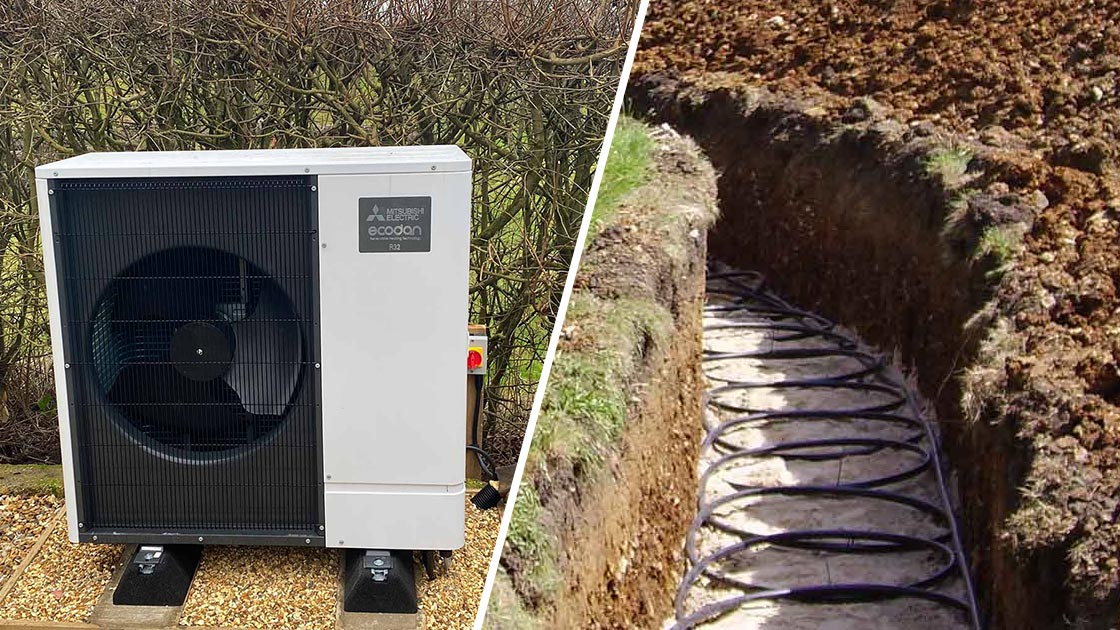Air Source vs Ground Source Heat Pumps: Key Differences
Heat pumps are an increasingly popular choice for homeowners looking to reduce energy costs and minimise their carbon footprint.
Among the different types available, two common options are air source and ground source heat pumps. But what is the difference between air source and ground source heat pumps, and which one is best suited for your needs?
In this article, we’ll explore the key differences between these systems to help you make an informed decision.
What Is a Heat Pump?
A heat pump is a device that transfers heat from one place to another. It can extract heat from the air, ground, or water and transfer it into your home, providing warmth during colder months. During the summer, a heat pump can reverse the process, cooling your home by removing heat. Heat pumps are efficient, eco-friendly, and can significantly lower energy bills.
What Are Air Source Heat Pumps?
Air source heat pumps (ASHPs) work by extracting heat from the outside air and transferring it into your home. Even when the air outside is cold, there is still some heat that can be captured and utilised. Here are some key features:
How Air Source Heat Pumps Work
Air source heat pumps absorb heat from the air and transfer it into a refrigerant. The heat is then compressed, increasing its temperature, before being transferred indoors. The process is reversed in summer, providing cooling.
Advantages of Air Source Heat Pumps
- Energy-efficient: ASHPs can deliver three times more energy than they consume.
- Lower installation costs: Generally cheaper to install compared to ground source systems.
- Ease of installation: Requires less space, making it ideal for smaller properties.
Disadvantages of Air Source Heat Pumps
- Performance affected by weather: Efficiency may decrease in extremely cold conditions.
- Noise levels: Outdoor units may produce some noise, which can be an issue for some users.
What Are Ground Source Heat Pumps?
Ground source heat pumps (GSHPs), also known as geothermal heat pumps, use the ground as a heat source. They transfer heat from the earth into your home using underground pipes filled with a water-antifreeze solution.
How Ground Source Heat Pumps Work
GSHPs extract heat from the ground using a network of pipes, known as a ground loop, buried in the garden or surrounding land. The fluid in the loop absorbs heat from the ground, which remains at a consistent temperature year-round. This heat is then transferred into the home.
Advantages of Ground Source Heat Pumps
- Consistent performance: Delivers reliable heat regardless of outdoor temperatures.
- Long lifespan: GSHPs can last up to 25 years or more.
- Efficient: Lower operating costs over time due to stable ground temperatures.
Disadvantages of Ground Source Heat Pumps
- High installation costs: Requires extensive groundwork, which can be costly.
- Space requirements: Needs ample land for installing the ground loop.
The Key Differences Between Air Source and Ground Source Heat Pumps
Understanding the differences between air source and ground source heat pumps is crucial for choosing the right system for your home.
Installation Process and Cost
- Air Source: Easier and cheaper to install, as it only requires an external unit. Ideal for homes with limited space.
- Ground Source: More complex installation, requiring excavation to lay underground pipes. Higher initial cost but greater long-term efficiency.
Energy Efficiency
- Air Source: Efficiency can vary depending on the outdoor temperature, generally providing a coefficient of performance (COP) of 3 to 4.
- Ground Source: More stable efficiency due to consistent ground temperatures, often reaching a COP of 4 to 5.
Environmental Impact
Both types of heat pumps are eco-friendly. However, ground source systems generally have a lower carbon footprint due to their efficiency, which translates to less energy consumption over time.
Which One Should You Choose?
The choice between air source and ground source heat pumps depends on several factors, including your budget, property size, and location.
Budget Considerations
If you’re on a tight budget, an air source heat pump may be the better option due to its lower installation costs. However, if you can invest more initially, a ground source heat pump can offer long-term savings.
Property Size and Location
- Small properties: Air source heat pumps are suitable for homes with limited space and no land for ground loops.
- Larger properties: Ground source heat pumps are ideal for homes with sufficient land, providing consistent performance.
Conclusion
Both air source and ground source heat pumps offer efficient and eco-friendly ways to heat your home. However, understanding the differences can help you choose the best system for your needs. Air source heat pumps are easier to install and cost less upfront, while ground source heat pumps provide better long-term efficiency and reliability.
If you’re considering installing a heat pump, contact us today for expert advice and a free consultation. Our team will help you find the right system to fit your home and budget.







